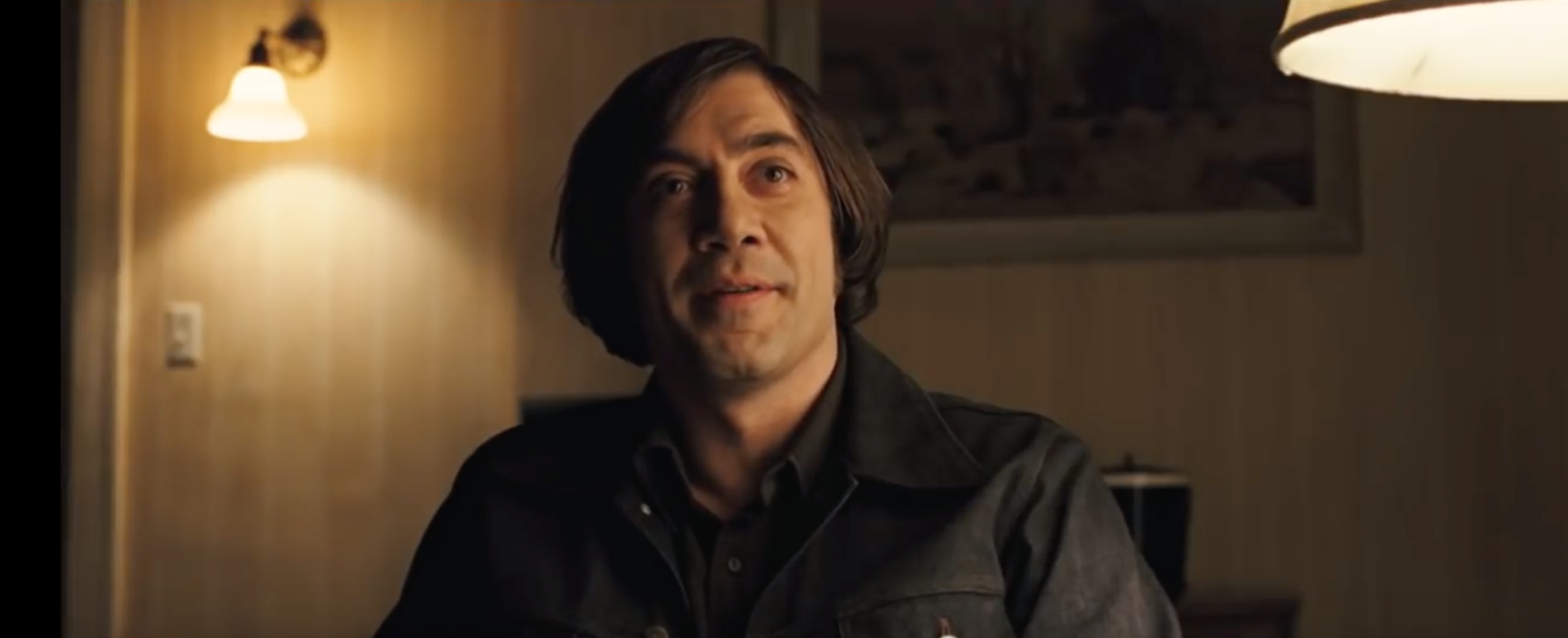Michael Cusumano here to take a fresh look at a film that never fails to reward it.

Scene: The Sad, Strange Death of Carson Wells
Moss: What's this guy supposed to be, the ultimate badass?
Wells: No, I wouldn't describe him as that.
Moss: How would you describe him?
Wells: I guess I would say he doesn't have a sense of humor.
But that’s not really accurate, is it?
Anton Chigurh displays frequent amusement throughout the Coen’s adaptation of Cormac McCarthy’s No Country For Old Men. It is simply that the humor exists on a wavelength only he can hear. Shortly after making that assessment quoted above, Woody Harrelson’s Carson Wells will learn just how mistaken he is...

Although by the time he’s the one staring down Chigurh’s profoundly unsettling smile, he is in no place to appreciate the absurdity of the situation. Of the many chilling acting choices in Bardem’s performance that smile is the one that haunts. Particularly, the sickening grin that floats to the surface when an ambush has left Carson at Chigurh’s nonexistent mercy.
“If the rule you followed brought you to this,” Chigurh taunts cryptically, “of what use was the rule?”
Carson knows full well what is in store and is in no mood for a Zen kōan. He defiantly answers Chigurh’s question with a question: “Do you have any idea how crazy you are?”
But again, Carson is off the mark. Yes, Chigurh is undeniably a psychopath but in this instance his question has a twisted logic. It’s a window into the serial killer’s mind, where his deadly encounters are a perpetual variation on the same joke and the punchline is always those unfortunate souls who didn’t realize that their every decision, no matter how trivial or innocuous, was setting them down a path to this moment, where they will meet their destruction. Normally, Anton has to savor the moment privately, but Carson’s full awareness of his impending doom increases Chigurh’s enjoyment exponentially. This is a man who is happy in his work.

Since 2007 I’ve read countless interpretations of No Country that posit Chigurh as supernatural being, maybe even the literal Reaper. To be fair the film leaves a few hooks to hang such fan theories on, like the way he seemingly vanishes from the hotel room at the end. I understand the impulse to tie the plot up with such a tidy bow, especially when the other option is to let the story’s unsettling ambiguities gnaw at your memory, but it is far more satisfying to take Chigurh simply as a man. Most stories are content merely to defeat evil, No Country For Old Men stands paralyzed in astonishment that it can exist so purely in human form, and you rob the tale of some of that power, I think, when you regard Chigurh as a specter. If he is as human as you or are I then that means there is nothing stopping anyone from behaving as he does, which is infinitely more disturbing to ponder than a homicidal ghost.
Thinking about the way viewers pore over the clues about Chigurh’s possible mystical nature I’m reminded, oddly, of Citizen Kane, in that there is much focus on the meaning of "Rosebud" when there is a much less famous scene following Kane’s election night defeat where he and Leland flat-out explain the character with the “love on your terms” conversation. Carson’s death feels like a similar scene. One that comes right up to the edge of explaining Chigurh... to the degree that he can be explained at all.
When you stand back from the film you notice that Harrelson’s character is not essential to the plot. He would’ve been easy to cut. Carson Wells is introduced and exits the film in such swift succession it's like a joke on the audience. In a normal film, that intro would guarantee his place as a major player, one who would die at the climax were he to perish at all. But then the randomness of his demise is the point. It prepares the audience to accept the fate of Moss, an even more violent upending of storytelling convention, and it goes a long way to explaining that Satanic grin on Javier Bardem’s face.

Carson’s estimation of Chigurh’s capacity for irony is proven wrong again, mere seconds after his death, when Anton wryly remarks “Not in the sense that you mean,” when Moss asks if Carson is there in the room. In a film where all the main characters are constantly and tragically wrong at least one of them isn’t losing sight of the lighter side.